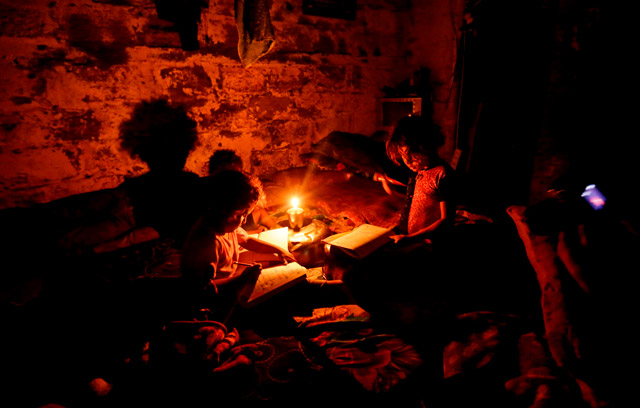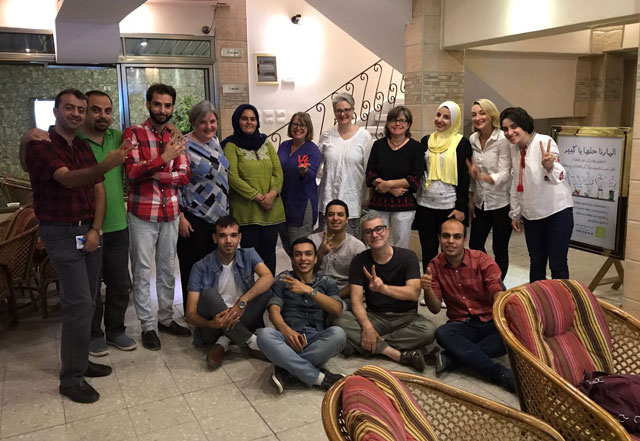
Honest, paywall-free news is rare. Please support our boldly independent journalism with a donation of any size.
The festival of Hanukkah commemorates the victory of the Maccabees, a Jewish priestly family from the Hasmonean dynasty, over the Seleucid Empire in 2nd century BCE. According to the Talmud, when the Maccabees entered the desecrated Temple in Jerusalem and attempted to relight the menorah, there was only enough oil for one day. But when they lit the fire, a miracle occurred and it lasted for eight full days.
What’s the meaning of this simple parable? Some say that the image of increasing light is appropriate to the dark winter season — a time in which many religious traditions celebrate festivals by kindling lights. Others say that this story underscores a powerful political/spiritual truth: Even in the bleakest of times, an oppressed people will somehow find the strength to continue the struggle.
When I light my Hanukkah candles this year, I plan to light an extra one each night for Gaza.
This year marks 10 years since Israel commenced its blockade of Gaza, turning this 140-square-mile strip of land into a virtual open-air prison. Next year will be the 10th anniversary of Israel’s Operation Cast Lead — a devastating military assault that killed 1,419 (including at least 308 children), wounded over 5,000 more and left more than 20,000 homeless. (The name of the operation, perversely enough, was a reference to a children’s Hanukkah song based on a poem by Israeli poet Chaim Nachman Bialik: “My teacher gave a dreidel to me/A dreidel of cast lead.”)
Two months ago, I had the opportunity to travel to Gaza as a staff person for the American Friends Service Committee (AFSC). My visit left me with a myriad of impressions and emotions, foremost of which was a sense of awe at the ability of Palestinian Gazans to live with resilience and dignity under the most oppressive of conditions.
This is, of course, not to minimize their trauma nor to tokenize them as victims. A recent, presumably well-meaning article in Ha’aretz did precisely that, interviewing a volunteer psychologist for Physicians for Human Rights, who portrayed Palestinians in Gaza as overwhelmingly obsessed with sex and addicted to behavior-altering drugs. The psychologist claimed that due to Gaza’s devastating conditions, many Palestinians have “lost their humanity” and are unable to “see the other, his pain.” In an important rejoinder to the article, Palestinian activist Nada Elia responded pointedly:
I do not want to minimise the severity of daily life in Gaza. I am someone who has insisted the siege be recognised as genocidal. Nevertheless, I am appalled at the callousness of the interviewer as she asks for an elaboration of how people in Gaza have lost their “internal morality,” their very “humanity”.
I saw a great deal of humanity during my short stay in Gaza. I traveled there to participate in strategic planning meetings with AFSC staff colleagues, to sharpen our vision for our Israel/Palestine programs in the US, Israel, the West Bank and Gaza. We began with three days of meetings in Ramallah, with our Gaza staff members joining us via Skype. Following these meetings, six of us traveled to Gaza to meet with our two full-time staff members there: Ali Abdel Bari and Firas Ramlawi.
Up until relatively recently, AFSC’s Palestine youth program focused largely on public achievement, seeking to strengthen the civic ties of youth to their communities. Our current program, Palestine Youth Together for Change (PYTC) is a more ambitious project, working to combat Palestinian geographical, social and cultural fragmentation in Israel, the West Bank and Gaza. It’s difficult to overestimate the devastating impact of this fragmentation — particularly on Palestinian youth who are growing up with increasing separation from one another. This isolation is most keenly felt, of course, by the youth of Gaza, who are literally imprisoned by Israel inside a small 140-square-mile strip of land.
 American Friends Service Committee staff with youth from their Gaza program. (Photo courtesy of Brant Rosen)
American Friends Service Committee staff with youth from their Gaza program. (Photo courtesy of Brant Rosen)
When we met the Gazan youth who participated in the PYTC program, they spoke powerfully about their experiences growing up with a strong sense of Palestinian identity while isolated from their peers in Israel and the West Bank. This particularly hit home for me when I heard one young woman speak of entering into Israel through the Erez Crossing for the first time to travel to the West Bank for meetings with her fellow participants. She was 18 years old and had never seen an Israeli Jew in person in her life. Up until that time, she said, she had only seen them as “helicopters, planes and bombs.” Needless to say, this contrasted dramatically with the experiences of her West Bank peers, who encountered Israeli soldiers as a very real, everyday presence in the streets and at checkpoints.
It’s also important to bear in mind that this isolation is not a “humanitarian” issue that can be fully addressed by greater NGO and civil society investment. Rather, it is the result of very real and very intentional policies promulgated by Israel to purposefully divide and weaken Palestinian society. By the same token, the PYTC program is not merely a youth service project; its ultimate goal is to strengthen Palestinian identity in order to counter the brutal and unjust occupation of their people. In this regard, this program is connected in important ways to AFSC programs in the US that promote “co-resistance”: initiatives that support the Palestinian civil society call for Boycott, Divestment and Sanctions; advocate for Palestinian children held by Israel in military detention; and educate the public about the devastating costs of the Gaza blockade. The latter program, “Gaza Unlocked,” seeks to educate the public about the reality of the blockade by sharing the stories — and the humanity — of the people who live there.
Here’s a sample of their testimonies:
College graduate Fidaa Zaanin, 27:
This is life. We should not give up. I will maintain my humanity and my dreams despite the siege. I believe in change, if not immediate then with time. I will be an example for my brothers and my sisters and whoever dreams of a future, for they are my hope for the future.
Freelance photographer Ezz Al Zanoon, 24:
We reject the images of us that are being shown to the world. We are humans. We are proud of our humanity. We are proud of our achievements despite the difficult circumstances. No one can achieve what we have done. Despite the blockade, the wars, the structured destructions, we continue to live and fight for a dignified life. We fight against the imposed restrictions, being triggered by our desire for life.
NGO project coordinator Shareef Hamad, 34:
I must challenge this situation. I don’t have any choice. This affects our daily lives and our emotional well-being. We are under all this pressure.
What inspires me is the faith that this situation is not eternal. I can change it or its consequences. I can at least limit its impact on me and those I love. According to history, no oppression lasts forever. This nation deserves better.
During our final night in Gaza, my colleagues and I walked through the streets of Gaza City on our way back from dinner. Because Gaza only receives four hours of electricity a day, the street lights and home windows around us were dark. The only light came from beachfront hotels that had their own generators. We were well aware that we were staying in the affluent tourist part of town and that we were privileged enough to soon be leaving Gaza to travel without restriction. But to paraphrase Shareef Hamad, I am inspired by the faith that no darkness is eternal.
During Hanukkah, we celebrate the miracle of light that sustains us even when the world is at its darkest. This Hanukkah, I’ll be lighting a candle for Gaza.
Media that fights fascism
Truthout is funded almost entirely by readers — that’s why we can speak truth to power and cut against the mainstream narrative. But independent journalists at Truthout face mounting political repression under Trump.
We rely on your support to survive McCarthyist censorship. Please make a tax-deductible one-time or monthly donation.